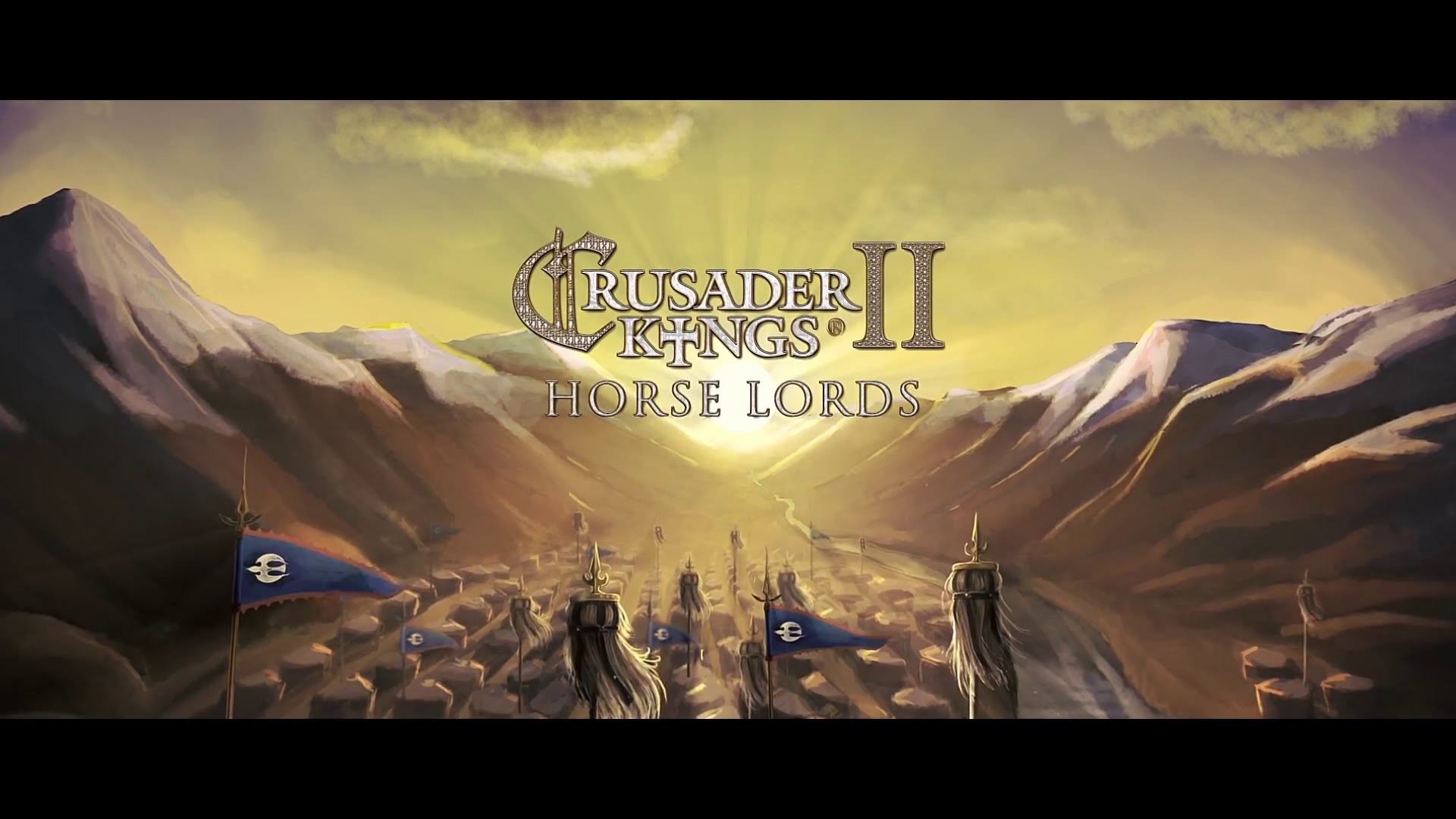Crusader Kings II: Horse Lords Collection
Horse Lords (HL) is the 8th major expansion for Crusader Kings II. It was released on 2015-07-14 alongside patch 2.4.1. It was announced on 2015-06-02 The expansion is fairly compatible with older save games; however, previously made ironman save games aren't compatible. The DLC unlocks playing as a nomadic government, independently of religion. However, becoming non-nomadic is restricted for religions which are DLC locked, as well as some religious flavor events. The DLC goal is to give some unique gameplay and flavour when playing as a nomadic ruler, different from the fixed settlements of Europe, while struggling to become the Great Khan – the Ruler of the Sky. This includes: Nomadic rule: contrary to tribal governments, nomads do not have permanent settlements. Nomad hordes simply have a total population, which grows relative to how many empty holding slots exist in their provinces (steppe provinces are best, but some other terrain types are also acceptable). A large fraction of the total population counts as Manpower, which is used to raise regiments (similar to retinues). Clan politics: with mostly empty holdings, nomads tend to have a lot fewer normal vassals than other realms. This is compensated by a variable number of member Clans, that fight for dominance. Mechanics include splitting/absorbing clans that get too large/small, and proclaiming feuds and blood oaths. Nomad succession: nomads no longer use ultimogeniture, but the most prestigious son or brother inherits. To get control over the heir, a nomad ruler can send his most promising brothers or sons to become mercenaries. Dynamic mercenaries: mercenary bands can now form dynamically, becoming available for hire by rulers in the general region. As they earn money, the size of their regiment increase. Raiding adventurers: should a horde lose its last province, the tribe will still exist, and may use its remaining armies to conquer another land in which to settle. Adventurers will use the money they gain from raiding to recruit more troops, and when they have grown to a certain level, they will try to become landed. Silk road: rulers of predefined provinces along the Road receive a passive boost to their castle, city and temple holdings. They can then build trade posts on land, which can be upgraded to make the Silk Road worth even more. However, if a war breaks out and a part of the trade route is caught in the conflict, the trade will be cut from that province and onwards (in a east-to-west direction) for that branch. The trade will instead go through any other branch and result in them receiving more of the trade than they normally would. Tributaries: new diplomatic relationship for nomad states forces defeated enemies to keep the Khan’s coffers filled. Tributaries pay a monthly tax to their suzerain and cannot refuse the suzerain's call to wars.
Crusader Kings II: Horse Lords Collection
Worldwide
13.99€
24.99€ 44% OFF
You may also like these games
Game description
Horse Lords (HL) is the 8th major expansion for Crusader Kings II. It was released on 2015-07-14 alongside patch 2.4.1. It was announced on 2015-06-02 The expansion is fairly compatible with older save games; however, previously made ironman save games aren't compatible. The DLC unlocks playing as a nomadic government, independently of religion. However, becoming non-nomadic is restricted for religions which are DLC locked, as well as some religious flavor events. The DLC goal is to give some unique gameplay and flavour when playing as a nomadic ruler, different from the fixed settlements of Europe, while struggling to become the Great Khan – the Ruler of the Sky. This includes:
- Nomadic rule: contrary to tribal governments, nomads do not have permanent settlements. Nomad hordes simply have a total population, which grows relative to how many empty holding slots exist in their provinces (steppe provinces are best, but some other terrain types are also acceptable). A large fraction of the total population counts as Manpower, which is used to raise regiments (similar to retinues).
- Clan politics: with mostly empty holdings, nomads tend to have a lot fewer normal vassals than other realms. This is compensated by a variable number of member Clans, that fight for dominance. Mechanics include splitting/absorbing clans that get too large/small, and proclaiming feuds and blood oaths.
- Nomad succession: nomads no longer use ultimogeniture, but the most prestigious son or brother inherits. To get control over the heir, a nomad ruler can send his most promising brothers or sons to become mercenaries.
- Dynamic mercenaries: mercenary bands can now form dynamically, becoming available for hire by rulers in the general region. As they earn money, the size of their regiment increase.
- Raiding adventurers: should a horde lose its last province, the tribe will still exist, and may use its remaining armies to conquer another land in which to settle. Adventurers will use the money they gain from raiding to recruit more troops, and when they have grown to a certain level, they will try to become landed.
- Silk road: rulers of predefined provinces along the Road receive a passive boost to their castle, city and temple holdings. They can then build trade posts on land, which can be upgraded to make the Silk Road worth even more. However, if a war breaks out and a part of the trade route is caught in the conflict, the trade will be cut from that province and onwards (in a east-to-west direction) for that branch. The trade will instead go through any other branch and result in them receiving more of the trade than they normally would.
- Tributaries: new diplomatic relationship for nomad states forces defeated enemies to keep the Khan’s coffers filled. Tributaries pay a monthly tax to their suzerain and cannot refuse the suzerain's call to wars.


